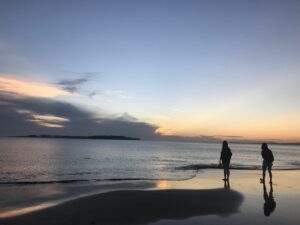Going to Therapy Where English isn’t the Dominant Language


Going abroad when you struggle with mental health or are used to a certain style of healthcare can be a daunting idea, especially if you’d like to study abroad where English isn’t the native language. Luckily, if you’re considering Buenos Aires, Argentina, you have some great options!
In 2005, the World Health Organization ranked Argentina as the country with the most psychologists per capita than anywhere else in the world. Almost half of these professionals can be found in and around the capital. There is even a part of the city nicknamed Villa Freud. This area around Plaza Guemes is nicknamed as such because of the many psychologist offices concentrated there. Almost everyone in Buenos Aires goes to therapy. In one of our first classes, my Spanish professor declared that if you’re over the age of 30 and you don’t see a therapist people will “think you’re crazy.” Along with attending therapy, Argentines are famous for being remarkably open, and it’s not uncommon for people to casually converse about emotional problems or their therapy sessions with friends.
While some pay to attend more expensive therapists or psychoanalysts, others simply walk to their local hospitals and utilize the free therapy services provided under Argentina’s public healthcare. Regardless, the stigma a lot of us are used to surrounding seeking mental health treatment is nowhere to be found, making accessing it all the more simple.
English Speaking Therapists aren’t Hard to Find!

While Spanish is the dominant language, Buenos Aires has a decent sized expat community, and bilingual therapists aren’t hard to come by! The IFSA staff at the Argentine Universities Program send out information about counseling in Buenos Aires before the start of the program and recommend that if you are going to therapy at home that you continue it while abroad. They connect students directly with therapists that meet their needs and if you want, you can schedule your first appointment before even booking your flight. Some therapists are Americans living in Buenos Aires while others are bilingual or fluent in multiple languages. The commute to these offices can be lengthy depending on where you’re placed with your host family but many therapists practice in more residential areas, making for a comfortable and stress free environment that can be relieving in a city as bustling as Buenos Aires.
Getting Comfortable With a New Therapist
You may have built a solid relationship with your therapist from home, but speaking to someone who is comfortable in the environment where you’re living can actually be helpful in the context of study abroad. Particularly, with professionals who are not native to Buenos Aires, it is likely they will be able to understand or relate to some of the emotions you have about living in a completely new place. Either way, it’s okay to be nervous! Trusting a new person can be hard and IFSA understands that some students may not like the first therapist they recommend. I’ve spoken to two students about attending therapy abroad, and while one got along with her therapist right away, the other didn’t like their first session and asked IFSA for a different recommendation. You might even decide that after trying a few sessions that therapy abroad isn’t for you. With the resources IFSA and the city itself provides, your options are always open!
An Example Where Going to Therapy Worked Out

My friend Katie who is also an IFSA student was eager to tell me about her experience going to therapy so far. She said that originally she wasn’t very eager to go to therapy abroad. Why spend time commuting and sitting in therapy when you could be exploring the city? Her plan was to go once and get to know the therapist in case she decided she needed to start going later on. However, after her first session she claimed to have felt so comfortable with the half guided, half self-directed style that she schedules regular appointments now. “I have been going more than expected and I am happy I am…she is from the United States and moved here so she can relate to my experiences as an international student really well.”
It is Possible

While seeking mental health treatment abroad might still seem like it just won’t work out, if you really want to study abroad being nervous about finding a good therapist shouldn’t stop you (especially if you’re considering Buenos Aires!). IFSA helps its students locate people that meet their needs and have actively checked to see that students who reported struggling with depression or anxiety are acclimating well in their host families and homes.
Of course, at the end of the day it is up to you if you decide to seek treatment abroad. Everyone experiences study abroad a little differently and while some may acclimate to the big changes more easily than others it is always reassuring to know that the resources you might need for a mentally healthy transition are there. That being said, accommodations can vary depending on location and host universities so make sure to get in contact with your program advisors early and allow yourself time to research your options.
Some Helpful Contacts and Resources:
IFSA’s insurance policy includes coverage of mental health and pre-existing conditions:
https://www.culturalinsurance.com/ifsa/
Emergency: +1 312-935-1703
IFSA Health and Safety:
hss@ifsa-butler.org
Argentina’s emergency numbers:
Police: 101 on any phone.
Medical Emergencies: 107 on any phone.
General emergencies in Buenos Aires: 911.
Argentina Suicide Prevention/Crisis Hotlines:
- 54 (0) 223 493 0430
- + 54 (11) 4758-255
- 54 (011) 4 783 888
Alex Kenoian is an International Relations & Computer Science double major at Mount Holyoke College and studies abroad with IFSA-Butler at the Argentine Universities Program in Buenos Aires in Spring 2018. She is an International Correspondent for IFSA-Butler through the Work-To- Study Program.